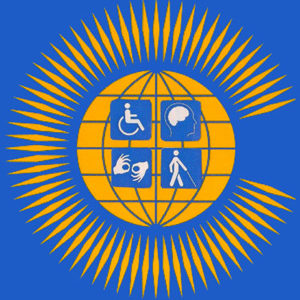Read the report concerning the course here.
Disabled activists, their organisations and leaders need to have a good understanding of the oppression we face as disabled people, regardless of our impairment. We need to understand what has to change. Thinking of us as a problem to be fixed, an object and as people without rights. We need to understand such old-fashioned thinking must change to a social model/human rights approach, in line with the UNCRPD and SDGs, where disabled people are in control of what happens to us as powerful subjects in civil society. We are capable of bringing about real social and economic change for the 450 million disabled people of the Commonwealth.
The Course consists of 14 modules. Each module has an introductory filmed presentation of about 1 hour, a printed course book (25-30 pages) with follow up activities to reinforce learning and an interactive 90 minute seminar. The film and seminar are captioned and signed in international sign language. The PowerPoints have an audio version and description. See the comments by course participants and the side meeting on the course at the UN Conference of State Parties 14 on 16th June.
Modules
- Models and Thinking About Disability – Implications for Action.
- The UN Convention on the Rights of People with Disabilities, the Sustainable Development Goals and their Impact on Disabled People’s Human Rights.
- Health – focusing on Mental Health and Covid-19.
- Innovation – focusing on Improving Access and Assistive Devices.
- Trade – focusing on Improving Livelihoods and Employment.
- Environment – focusing on the Impact of Humanitarian Situations.
- Respect for Law – focusing on Eliminating Stigma and Discrimination.
- Youth and Disability Rights in collaboration with Commonwealth Children and Youth Disability Network.
- Inclusive Education.
- Women and Girls.
- Anti-Racism, Equality and Respect for Indigenous Peoples and Ethnic Minorities.
- Data of Disability.
- Building DPOs – Campaigning and Increasing OUR voice.
- Influencing Government.
The Language CDPF uses on the course.
Disabled people: Why we still choose to call ourselves ‘disabled people’. In the Commonwealth Disabled People’s Forum (CDPF) we call ourselves ‘disabled people’ because of the development of the ‘social model of disability’. In the C19th and C20th, a disabled person’s medical condition was thought to be the root cause of their exclusion from society, an approach now referred to as the ‘medical or individual model’ of disability. We use the ‘social model of disability’, where the barriers of environment, attitude and organisation are what disable people with impairments and lead to prejudice and discrimination. So, to call ourselves ‘persons with disabilities’ is to accept that we are objects and powerless. We also view ourselves as united by a common oppression so are proud to identify as ‘disabled people’ rather than ‘people with disabilities’. When we are talking about the UN Convention on the Rights of Persons with Disabilities we will use ‘people or persons with disabilities’.
The course was delivered by experienced Disability Equality Trainers who are members of the CDPF Training Sub-Committee, led by Richard Rieser between February and May 2021. The content of the course was focused on the Commonwealth Heads of Government Meeting (CHOGM), implementation of the Sustainable Development Goals (SDGs) and the United Nations Convention on the Rights of Persons with Disabilities (UNCRPD). It is aimed at activists in Disabled People’s Organisations (DPOs) and disabled activists throughout the Commonwealth. Each module was viewed with the Covid/Post Covid-19 Build Back Better perspective. It is planned to disseminate these materials more widely cross Commonwealth in non-internet supported formats to reach wider groups of disabled people.
